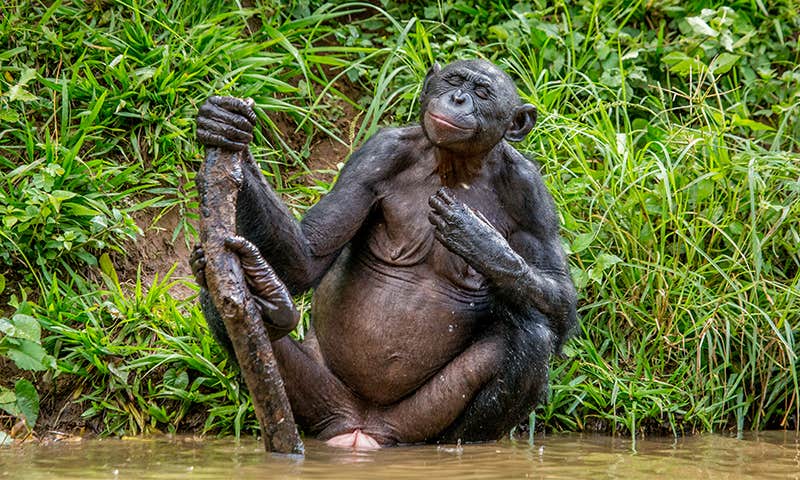by BRIAN GALLAGHER


Zoologist Lucy Cooke uncovers the sexual power of females in the animal world
Lucy Cooke was in the Serengeti, making a BBC documentary about animal communication, when the lion expert in the Jeep with her played the sound of a roar from another lion’s territory. Three lions, two males and one female, approached. The two males disappeared when they saw there was nothing that resembled a rival. But the female lion pinned them, circling the Jeep. They were stuck for two hours. What was going on? Cooke was informed the female wanted to mate with them. “That female lion—she’s incredibly promiscuous,” the lion expert told her. “She’ll mate up to a hundred times with multiple males during her fertile period.”
This blew Cooke’s mind. “I was thrilled and quite delighted by the licentious promiscuity of the lioness,” Cooke told Nautilus in a recent conversation. That’s when the seed of her new book, Bitch: On the Female of the Species (or, in the United Kingdom edition, A Revolutionary Guide to Sex, Evolution, and the Female Animal) was planted. Cooke calls it a “shocking revelation” to have learned that “much of what I had been taught as gospel at university, the very foundations of evolutionary biology, had been distorted by prejudice.” At Oxford University, where Cooke earned her master’s in zoology, she was taught that, almost as a matter of biological law, males were the promiscuous ones, and females were choosy and chaste. The idea dates back to Charles Darwin’s theory of sexual selection, and Bitch is about bringing Darwin up to date. (“This isn’t your grandfather’s evolutionary biology,” the book’s online description reads.)
“His theory of sexual selection was infused with the chauvinism of the period, unfortunately, which was very surprising to me, because Darwin’s my hero,” Cooke said. “He’s the reason why I studied evolution. He is an extraordinary, meticulous scientist. It’s fascinating that someone who is as cautious and thorough and methodical as Darwin is also not immune to cultural bias.”
Bitch is an entertaining and erudite corrective to years of research bias against the idea of female agency in evolution and the study of female sexual anatomy. During our conversation, Cooke was jovial, and talked a lot about sex—duck sex, dolphin sex, spider sex, as well as same-sex “GG rubbing” among bonobos. She explained why sex didn’t evolve for just reproduction (“another real Victorian idea”). She also talked about what it might mean for humanity that bonobos were able to “overthrow the patriarchy through ecstatic sex.”
What was your impetus to write Bitch?
We are living in a time where being female has never been more scrutinized or politicized. I feel that there’s been a revolution in our understanding of what it means to be female. And that revolution started in the early 1980s with the likes of Sarah Hrdy and Patricia Gowaty first challenging these stereotypes that Darwin had set in stone of the passive female that’s chaste, submissive, and coy. But even though they started those challenges and, in many cases, won them in as early as the 1980s, much of that thinking has taken a long time to permeate into popular culture and even into science.
Is there one insight in particular that you want to leave readers with?
What I would hope is people understand that biological sex isn’t a crystal ball. Females are not meant to behave in a certain way because they produce eggs. Males are not meant to behave in a certain way because they produce sperm. The variety that we see in nature of both the expression of sex and the spectrum of sex itself, should inspire us to see the limitless possibilities of the female experience, and not feel boxed in by stereotypes.
Gowaty, who’s been questioning these stereotypes for 30-odd years now, has taken to task Angus Bateman’s study, a fruit fly experiment in the 1940s. It underpinned the stereotypes that females had nothing to gain by mating with multiple males. Whereas males have everything to gain. This was part of a law that held that males are promiscuous and females are chaste.
Gowaty has taken a forensic scalpel to Bateman’s study, reproduced it herself, and gone back to his original notes, and found that even his own data doesn’t support his results. He suffered from a case of confirmation bias. He skewed the results, and he collated them in a way which substantiated what he wanted to see rather than what was in front of his eyes.
Nautilus for more
